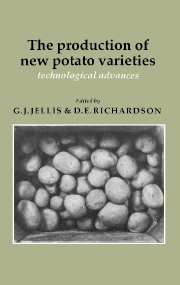Book contents
- Frontmatter
- Contents
- List of contributors
- Preface
- Editors' note and acknowledgements
- Introduction
- The development of potato varieties in Europe
- Genetic Resources
- Breeding Strategies
- Selection and Screening Methods
- Variety Assessment
- Potato variety assessment in the Federal Republic of Germany
- Potato variety assessment in France
- Variety assessment in The Netherlands
- Potato variety assessment in Poland
- Potato variety assessment in the UK
- Use of common origin seed for potato trials
- Micropropagation – an aid in the production of new varieties
- Testing potato varieties for response to drought and irrigation
- Testing varieties for resistance to and tolerance of Globodera pallida
- Testing for glycoalkaloids
- Methods for calculating 1–9 values to express the resistance of potato varieties to diseases
- Establishing standards in variety assessment
- Consumer quality requirements in the United Kingdom
- The effects of fertilizer treatments on a range of old and new early-maturing potato varieties
- Variety trials in Egypt, with special reference to dormancy
- Semi-conventional Breeding Methods
- True Potato Seed
- Unconventional Breeding Methods
- Commentary
- Index
Potato variety assessment in the Federal Republic of Germany
Published online by Cambridge University Press: 05 March 2012
- Frontmatter
- Contents
- List of contributors
- Preface
- Editors' note and acknowledgements
- Introduction
- The development of potato varieties in Europe
- Genetic Resources
- Breeding Strategies
- Selection and Screening Methods
- Variety Assessment
- Potato variety assessment in the Federal Republic of Germany
- Potato variety assessment in France
- Variety assessment in The Netherlands
- Potato variety assessment in Poland
- Potato variety assessment in the UK
- Use of common origin seed for potato trials
- Micropropagation – an aid in the production of new varieties
- Testing potato varieties for response to drought and irrigation
- Testing varieties for resistance to and tolerance of Globodera pallida
- Testing for glycoalkaloids
- Methods for calculating 1–9 values to express the resistance of potato varieties to diseases
- Establishing standards in variety assessment
- Consumer quality requirements in the United Kingdom
- The effects of fertilizer treatments on a range of old and new early-maturing potato varieties
- Variety trials in Egypt, with special reference to dormancy
- Semi-conventional Breeding Methods
- True Potato Seed
- Unconventional Breeding Methods
- Commentary
- Index
Summary
INTRODUCTION
In our country potato breeding is done by private breeders, with the exception of the Bayerische Landesanstalt für Bodenkultur und Pflanzenbau, Freising. Institutes like Max-Planck-Institut für Zuchtungsforschung in Cologne evaluate species from South America with resistance to diseases or other special qualities, and release their adapted clones to the breeders. The assessment of potato varieties is done by the Bundessortenamt at Hannover in cooperation with many other institutions. Like a patent office, the Bundessortenamt grants protection rights to the breeder for a new variety – Plant Breeders' Rights. This is based on the Variety Protection Act which was revised in 1985.
This Seed Act confirms that seed of agricultural species cannot be offered for sale unless the variety concerned is on the registered list of the Bundessortenamt. In order to be registered the variety must be distinct from other varieties, sufficiently uniform and stable, of value for cultivation and use and suitably named for registration. A variety is considered to be of value for cultivation and use if, in comparison with similar registered varieties, there is a clear improvement in characters concerned with crop cultivation, the utilization of harvested crops or any product obtained from such crops.
DISTINCTNESS, UNIFORMITY AND STABILITY
Assessment of DUS is based on sprout morphology under diffuse light and a field trial at one site with three replications for 2 to 3 years.
- Type
- Chapter
- Information
- The Production of New Potato VarietiesTechnological Advances, pp. 110 - 113Publisher: Cambridge University PressPrint publication year: 1987
- 1
- Cited by



